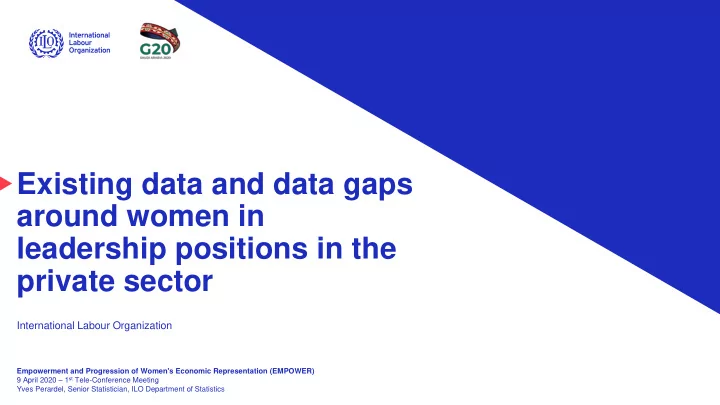

Existing data and data gaps around women in leadership positions in the private sector International Labour Organization Empowerment and Progression of Women's Economic Representation (EMPOWER) 9 April 2020 – 1 st Tele-Conference Meeting Yves Perardel, Senior Statistician, ILO Department of Statistics
2 Content Definitions Key global statistics Employment Part-time workers Managerial positions Senior and middle management positions Leadership positions in the private sector Existing data shared with the ILO and data gaps Advancing social justice, promoting decent work
3 Definitions Employment: persons doing, at least for one hour, an activity for pay or profit in a reference week. Part-time workers : persons working usually less than 35 hours per week (for international comparative purposes). ISCO-08 : International Standard Classification of Occupations (latest revision in 2008). Among the 10 major groups, category “01” is for the managerial positions (Managers). It is considered the highest category in ISCO. Senior and middle management : it includes “chief executives, senior officials and legislators”, “administrative and commercial managers” and “production and specialized services managers”. Advancing social justice, promoting decent work
4 Key global statistics 3.3 billion people are in employment in the world Among them, 2.0 billion men and 1.3 billion women 153 million people are in managerial positions 110 million are men but only 43 million are women ! Advancing social justice, promoting decent work
5 Women never reach half of the employment population Country Total employment (in thousands) Share of women (%) For all countries, the share Russian Federation 72,532 48.6 remains below 50% France 27,122 48.3 Canada 19,056 47.6 Share of women in total Australia 12,876 47.1 employment goes from United States 157,538 47.0 48.6% down to 13% United Kingdom 32,534 46.7 Germany 41,915 46.6 Data are available for 18 Japan 67,240 44.5 countries South Africa 16,571 44.0 Brazil 92,603 43.9 Argentina 11,745 43.5 South Korea 27,231 43.1 Italy 23,215 42.1 Indonesia 125,536 39.5 Mexico 54,994 39.1 Turkey 28,734 31.4 India 360,574 21.5 Saudi Arabia 13,278 13.0 Advancing social justice, promoting decent work Source: National labour force surveys; latest year available.
Share of women among part-time workers (%) 6 80.0 70.0 60.0 50.0 Part-time workers 40.0 30.0 are mostly women 20.0 10.0 0.0 In Japan, Germany, France, the UK and Italy, more than 70% of part- time workers are women 60.0 Women are always the majority of 50.0 the part-time workers except in India Share of women in 40.0 where the share is below 50% part-time work (%) 30.0 The share of women in part-time is Share of always higher than the global share part-time 20.0 workers (%) of part-time workers 10.0 Data are available for 15 countries 0.0 Advancing social justice, promoting decent work Source: National labour force surveys; latest year available.
Share of women in managerial positions among total managerial positions (%) 7 60.0 50.0 40.0 Only few women in 30.0 managerial positions 20.0 10.0 0.0 Looking at the highest category of ISCO, the managerial positions, the situation is worrying for women Share of women in managerial positions among all women in employment (%) Except for Indonesia, the share of 12.0 women among managers is always far below 50% 10.0 8.0 For 4 countries, the share is even below 20%, which means less than 1 manager 6.0 out of 4 is a woman 4.0 Data are available for 16 countries 2.0 0.0 Advancing social justice, promoting decent work Source: National labour force surveys; latest year available.
8 Even lower share in senior and middle management positions Share of women in senior and middle management positions among total senior and middle management positions (%) 45.0 The share is even lower when we restrict 40.0 to senior and middle management 35.0 positions among managers In Indonesia for example, the share is 30.0 now only 19.4% 25.0 In 3 countries, among 5 senior managers, 20.0 not even 1 is a woman 15.0 Data are available for 13 countries 10.0 5.0 0.0 Advancing social justice, promoting decent work Source: National labour force surveys; latest year available.
9 Similar situation in the private sector Share of women in managerial positions in the private sector among total managerial positions in the private sector (%) In the private sector, among the persons 50.0 working in managerial positions, the 45.0 share of women is also always below 40.0 50% 35.0 Data are available only for 8 countries. 30.0 Large number of missing data as we 25.0 need to cross tabulate several indicators 20.0 (access to microdata is mandatory here) 15.0 10.0 5.0 0.0 France United Brazil United Mexico Argentina Indonesia Turkey States Kingdom Advancing social justice, promoting decent work Source: National labour force surveys; latest year available.
10 Existing data shared with the ILO and data gaps 7 countries among the G20 economies have no data gap (Argentina, Brazil, France, Indonesia, Mexico, the United Kingdom and the United States). These countries share their labour force survey microdata with the ILO (or they are publicly available online). 9 countries have limited gaps. They either share their microdata but some variables are missing or they don’t share their microdata but display most information on their websites. 2 countries have major gaps because they do not share microdata and display limited information on their websites. 1 country has no data available. This country does not share microdata nor display any information on its website. Advancing social justice, promoting decent work Source: National labour force surveys; latest year available.
11 Thank you for your attention Advancing social justice, promoting decent work
Recommend
More recommend